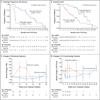DNA-Repair Defects and Olaparib in Metastatic Prostate Cancer
- PMID: 26510020
- PMCID: PMC5228595
- DOI: 10.1056/NEJMoa1506859
DNA-Repair Defects and Olaparib in Metastatic Prostate Cancer
Abstract
Background: Prostate cancer is a heterogeneous disease, but current treatments are not based on molecular stratification. We hypothesized that metastatic, castration-resistant prostate cancers with DNA-repair defects would respond to poly(adenosine diphosphate [ADP]-ribose) polymerase (PARP) inhibition with olaparib.
Methods: We conducted a phase 2 trial in which patients with metastatic, castration-resistant prostate cancer were treated with olaparib tablets at a dose of 400 mg twice a day. The primary end point was the response rate, defined either as an objective response according to Response Evaluation Criteria in Solid Tumors, version 1.1, or as a reduction of at least 50% in the prostate-specific antigen level or a confirmed reduction in the circulating tumor-cell count from 5 or more cells per 7.5 ml of blood to less than 5 cells per 7.5 ml. Targeted next-generation sequencing, exome and transcriptome analysis, and digital polymerase-chain-reaction testing were performed on samples from mandated tumor biopsies.
Results: Overall, 50 patients were enrolled; all had received prior treatment with docetaxel, 49 (98%) had received abiraterone or enzalutamide, and 29 (58%) had received cabazitaxel. Sixteen of 49 patients who could be evaluated had a response (33%; 95% confidence interval, 20 to 48), with 12 patients receiving the study treatment for more than 6 months. Next-generation sequencing identified homozygous deletions, deleterious mutations, or both in DNA-repair genes--including BRCA1/2, ATM, Fanconi's anemia genes, and CHEK2--in 16 of 49 patients who could be evaluated (33%). Of these 16 patients, 14 (88%) had a response to olaparib, including all 7 patients with BRCA2 loss (4 with biallelic somatic loss, and 3 with germline mutations) and 4 of 5 with ATM aberrations. The specificity of the biomarker suite was 94%. Anemia (in 10 of the 50 patients [20%]) and fatigue (in 6 [12%]) were the most common grade 3 or 4 adverse events, findings that are consistent with previous studies of olaparib.
Conclusions: Treatment with the PARP inhibitor olaparib in patients whose prostate cancers were no longer responding to standard treatments and who had defects in DNA-repair genes led to a high response rate. (Funded by Cancer Research UK and others; ClinicalTrials.gov number, NCT01682772; Cancer Research UK number, CRUK/11/029.).
Conflict of interest statement
No other potential conflict of interest relevant to this article was reported.
Figures



Comment in
-
Third of men with treatment resistant prostate cancer respond to drug that targets gene defect, study finds.BMJ. 2015 Oct 30;351:h5783. doi: 10.1136/bmj.h5783. BMJ. 2015. PMID: 26518710 No abstract available.
-
Molecular stratification and repair defects: revealing hidden treasures.Nat Rev Clin Oncol. 2015 Dec;12(12):683. doi: 10.1038/nrclinonc.2015.205. Epub 2015 Nov 17. Nat Rev Clin Oncol. 2015. PMID: 26573421 No abstract available.
-
Moving Beyond the Androgen Receptor in Advanced Prostate Cancer Commentary on: DNA-repair Defects and Olaparib in Metastatic Prostate Cancer.Urology. 2016 Mar;89:10-1. doi: 10.1016/j.urology.2015.12.002. Epub 2015 Dec 23. Urology. 2016. PMID: 26723184 No abstract available.
-
The promising role of poly(ADP-ribose) polymerase inhibitors in prostate cancer.Asian J Androl. 2016 Jul-Aug;18(4):592-3. doi: 10.4103/1008-682X.172821. Asian J Androl. 2016. PMID: 26908063 Free PMC article.
-
Getting personal with prostate cancer: DNA-repair defects and olaparib in metastatic prostate cancer.BJU Int. 2017 Jan;119(1):8-9. doi: 10.1111/bju.13522. Epub 2016 Jun 9. BJU Int. 2017. PMID: 27154575 No abstract available.
-
Re: DNA-repair Defects and Olaparib in Metastatic Prostate Cancer.Eur Urol. 2016 Jul;70(1):204-5. doi: 10.1016/j.eururo.2016.03.059. Epub 2016 Apr 18. Eur Urol. 2016. PMID: 27302290 No abstract available.
-
Re: DNA-Repair Defects and Olaparib in Metastatic Prostate Cancer.J Urol. 2016 Apr;195(4 Pt 1):925-8. doi: 10.1016/j.juro.2016.01.052. Epub 2016 Jan 22. J Urol. 2016. PMID: 27302781 No abstract available.
References
Publication types
MeSH terms
Substances
Associated data
Grants and funding
- C1491/A15955/CRUK_/Cancer Research UK/United Kingdom
- 17528/CRUK_/Cancer Research UK/United Kingdom
- 14276/CRUK_/Cancer Research UK/United Kingdom
- 13239/CRUK_/Cancer Research UK/United Kingdom
- 8336/CRUK_/Cancer Research UK/United Kingdom
- 15007/CRUK_/Cancer Research UK/United Kingdom
- R01 CA182569/CA/NCI NIH HHS/United States
- PG12-49/PCUK_/Prostate Cancer UK/United Kingdom
- 13230/CRUK_/Cancer Research UK/United Kingdom
- MR/M003272/1/MRC_/Medical Research Council/United Kingdom
- C12540/A12829/CRUK_/Cancer Research UK/United Kingdom
- C1491/A9895/CRUK_/Cancer Research UK/United Kingdom
- P30 CA056036/CA/NCI NIH HHS/United States
- C12540/A13230/CRUK_/Cancer Research UK/United Kingdom
- 12829/CRUK_/Cancer Research UK/United Kingdom
LinkOut - more resources
Full Text Sources
Other Literature Sources
Medical
Research Materials
Miscellaneous
